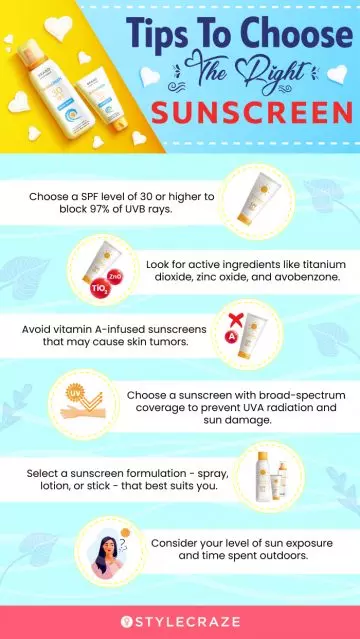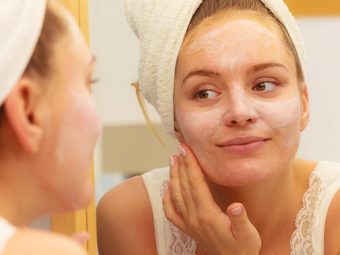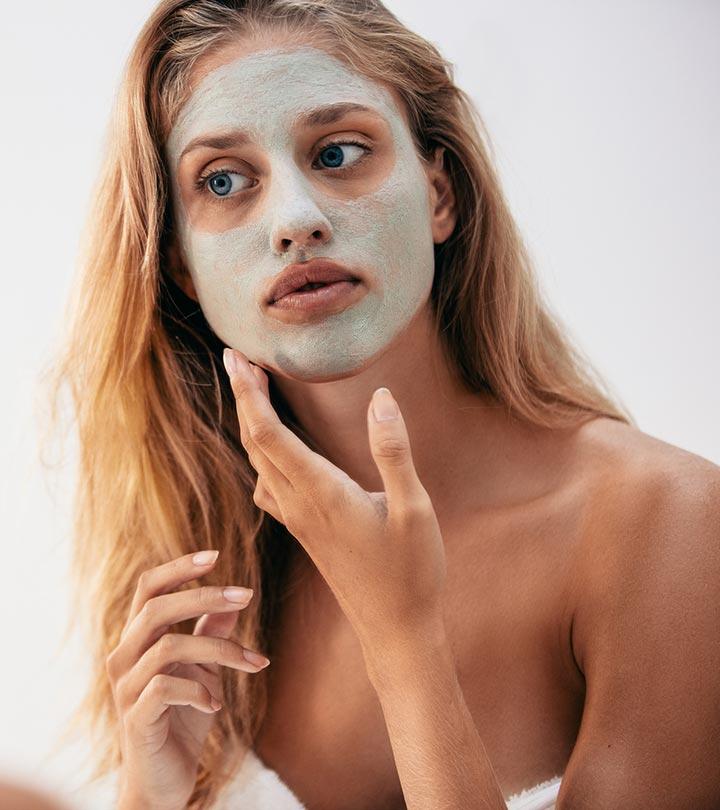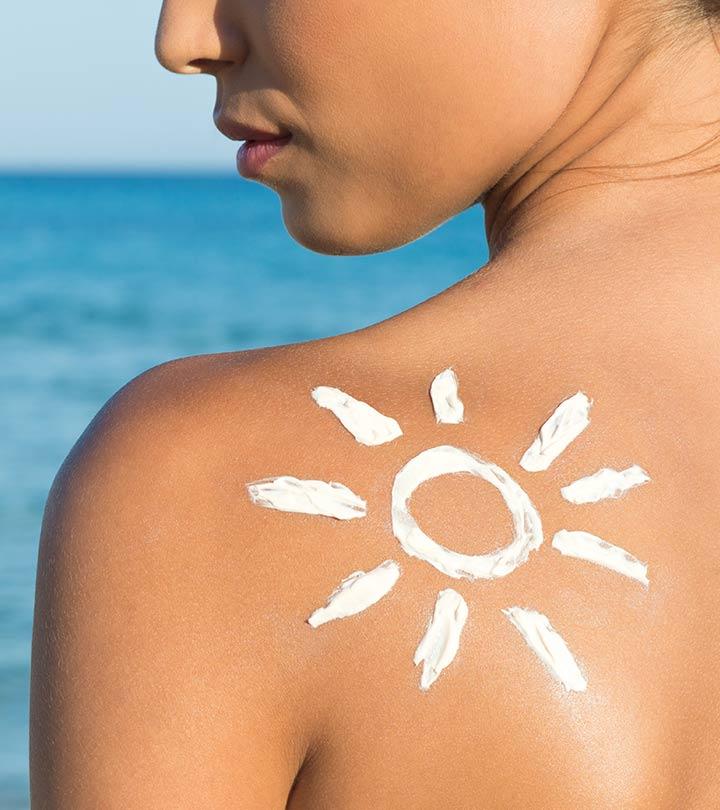How To Choose Sunscreen
Your sun protection products may contain ingredients you might need to be careful of.

Image: ShutterStock
Sunscreen is crucial in your daytime skin care routine. Whether going out for a few hours or vacationing at a beach or pool side, applying the right sunscreen to protect your skin from the sun’s harmful rays is necessary. So, how to choose a sunscreen? What are the things you need to look for while buying one? We will help you find out.
Your skin becomes vulnerable to several issues due to continuous exposure to UV radiation. It may cause skin damage, wrinkles, sunburn, and even skin cancer (1). Since we cannot avoid going out, it is best to shield the skin with sunscreen.
If you do not know how to choose the right sunscreen, this article is for you. This article provides you the ultimate guide to picking a sunscreen. Read on.
In This Article
How Does Sunscreen Work?
Sunscreen primarily works by blocking and absorbing UV rays through various physical and chemical particles (2).
While the physical particles such as zinc oxide and titanium dioxide help reflect UV radiation from the skin, the chemical ingredients in the sunscreen react with the radiation before it penetrates the skin. They also absorb the sun rays and release energy in the form of heat (2).
As stated, choosing the right sunscreen can make a big difference in your skin care regimen. In the following section, we have listed the factors you must consider before choosing the right sunscreen for you.
How To Choose The Right Sunscreen?
When choosing a sunscreen, it is essential to consider any allergies you may have to specific ingredients, its safety, and its potential toxicity. You also must ensure the ingredients in the sunscreen do not disrupt your hormone balance.
1. Consider SPF (Sun Protection Factor)
SPF is primarily a measure of how much UVB light the sunscreen can filter out. Using sunscreen with an SPF of at least 15 will help protect you from this daily exposure to UV rays (3).
However, most dermatologists recommend using an SPF of at least 30 as it blocks about 97 percent of UVB rays (SPF 15 may block only 93 percent of the UV rays) (4).
Ensure you apply enough sunscreen to various exposed areas of the skin every day. This is especially important on days when you are likely to spend extended periods outdoors.
 Quick Tip
Quick Tip2. Look For The Active Ingredients
Check the active ingredients in the sunscreen. Look for formulas that contain titanium dioxide, zinc oxide, and avobenzone (3).
Make sure you avoid sunscreens with vitamin A (commonly referred to as retinyl palmitate). Vitamin A is thought to increase the rate of skin tumors (5).
3. Pick Broad Spectrum SPF
Pick a sunscreen with broad-spectrum coverage and SPF 30 to 50. It helps protect your skin better from sunburn and sun damage. It also better helps prevent UVA radiation (6).
You may want to avoid products with a very high SPF(over 50). It is often believed that such products do not offer any extra protection and are expensive too.
 Quick Tip
Quick Tip4. Sunscreen Formulation

Sunscreen formulation typically refers to a sunscreen’s delivery format and affects how it feels and looks on an individual’s skin. There are three common sunscreen formulations available on the market. Although each of these forms has its benefits, they can all offer sun protection if used right:
- Sunscreen Sprays
These are perfect for applying sunscreen to hard-to-reach places on the body. Even though sprays are great for the body, those might not be the best sunscreens for the face. Spray sunscreen is a good option for anyone with a lot of body hair. However, make sure not to inhale the spray while applying.
- Sunscreen Lotions
These are among the most common and moisturizing sunscreen formulations available. Lotion sunscreen is available in multiple variants to cater to various skin types.
- Sunscreen Sticks
These are among the most portable and less messy options. You can use them by applying them to your skin and rubbing them in. They are a convenient option and are especially suitable for travel. They have minimal chances of leakage.
In general, all sunscreens have a shelf life of three years. Store them in a cool and dry place for best results.
5. Consider Your Level Of Sun Exposure
One of the other essential factors to keep in mind when choosing sunscreen is your level of sun exposure. For instance, you must consider how long you will be exposed to the sun, how strong the sun is, and what activities you will be performing while being exposed to the sun.
Typically, the strength of the sun is measured on the Ultraviolet (UV) Index, which ranges from 1 (low) to 11+ (extreme). These UV rays are strongest from 10 a.m. to 4 p.m., and when the UV Index is at 8 or above, our unprotected skin can burn in 15 minutes or less. Based on your level of sun exposure, here is what you need to choose as your sunscreen:
- Outdoors: If you are indulged in outdoor activities for an extended period (two hours or more), go for sunscreen with SPF 30 or higher, depending on your skin color.
- Sports/swimming: If you are going for sports outdoors or in water, it is best to choose a sweat-resistant or water-resistant sunscreen. Go for SPF 30 or higher, depending on your skin color, and reapply every 40 to 60 minutes.
- Every day: On regular days when you will be in the sun and shade, make sure to wear sunscreen with at least SPF 15.
Apart from picking the right sunscreen, there are a few other steps you can take to protect your skin from sun damage. Some of them are listed below.
Other Ways To Protect Your Skin From The Sun
1. Limit Your Exposure To The Sun
When you go out, try to limit your direct exposure to the sun by seeking shade in some form.
2. Cover Up
Dress appropriately along with a wide-brimmed hat to protect your skin from the sun as much as possible. Protect your eyes with sunglasses that deflect harmful rays.
3. Carry An Umbrella
If you need to walk out in the sun, it is best to carry an umbrella to stay well protected.
Read to know a few additional tips on sunscreen use.
Sunscreen Usage Tips
- Always wear sunscreen irrespective of the time of the year.
- If you are in swimwear, apply about two tablespoons of sunscreen to the exposed parts of your body. If you use a sunscreen spray, make sure to apply an even sheen over the whole body.
- Apply sunscreen to all exposed parts of the body, including your face, hands, feet, ears, neck, and top of the head (if your skin is exposed).
- Make sure to put a base coat of SPF 15 or 30 all over the exposed parts at least half an hour before stepping into the sun. Reapply every two hours.
- Ensure you reapply sunscreen after excessive sweating, swimming, or toweling off. Always follow the label guidelines for reapplication.
Considering your skin type is also an essential aspect of choosing the right sunscreen. In the next section, you will know the best sunscreen options for sensitive or acne-prone skin.
Which Sunscreen Is Best For Sensitive Or Acne-Prone Skin?
Acne-Prone Skin
Sunscreens are known to clog pores. Hence, it is essential to choose oil-free formulas for the face. You can use non-comedogenic sunscreens (that do not contain ingredients that block skin pores).
For dry skin, you can go for moisturizers with sunscreen or sunscreens that contain hydrating ingredients.
Sensitive Skin (Or If You Avoid Chemicals)
Sensitive skin remains fresh and vibrant when exposed to the least amount of ingredients it may otherwise react to. Opt for a physical or mineral sunscreen as it features zinc oxide and titanium dioxide that protect the skin (3). These two key ingredients would not burn or sting eyes. They work by sitting on top of your skin and form a barrier to protect you from the sun.
Skin Color
Your skin color largely determines the SPF level you should wear. For instance, if you are fair-skinned and always or usually burn, it is best to wear SPF 30 or higher. On the contrary, if you are medium to dark-skinned, or you usually tan and never burn, you can go with SPF 15.
Another particularly hard skin type to choose a sunscreen for is oily skin. Most ingredients used in regular sunscreens tend to clog oily skin, leading to breakouts. Learn how to pick the right one for this skin type below.
How To Choose Sunscreen For Oily Skin?
When selecting a sunscreen for oily skin, choose non-comedogenic and oil-free options to prevent breakouts and pore clogging, as the sebaceous glands are already producing too much sebum. Look for mineral formulas that contain ingredients like titanium dioxide and zinc oxide, as these are lightweight and gentle on the skin. Opt for sunscreens with a matte finish that may reduce excess shine. Additionally, consider powder sunscreens for easy, on-the-go application that gives those with oily skin a matte look. You can also try water-based sunscreens that don’t clog your pores. Lastly, always choose a broad-spectrum SPF with at least SPF 30, and read reviews and labels for the best pick.
Infographic: Tips To Choose The Right Sunscreen
While the importance of sunscreen is known to everyone, choosing the right sunscreen for your skin can be a task. Moreover, applying sunscreen with low SPF or the wrong ingredients can expose your skin to severe skin damage and risks. No worries, we got you covered!
Check out the infographic below to read the basic tips you should keep in mind the next time you purchase a sunscreen for yourself. Illustration: StyleCraze Design Team
Shielding the skin with sunscreen is one of the best and most important practices in skin care. Continuous exposure to UV rays makes your skin more prone to issues like wrinkles, sun damage, sunburn, and even cancer. However, choosing the right, dermatologist-recommended sunscreen will help solve and prevent these issues. When choosing a sunscreen, you may have to look for several factors, including skin type, allergies, sun exposure level, SPF, fragrance-free factor, formulation, and ingredients. Following the tips and instructions listed above may help you choose the right sunscreen.
Frequently Asked Questions
What is the best type of sunscreen – spray, lotion, stick, or gel?
This primarily depends on your personal preference. You need to remember that irrespective of the above options, any sunscreen is only useful if you use it the right way – to apply an ounce of sunscreen to the entirety of your exposed body.
What is the difference between a chemical sunscreen and a physical sunscreen?
Chemical and physical sunscreens essentially refer to the active ingredients used in them. While the chemical sunscreen uses active ingredients that readily absorb the sun’s rays and are more easily absorbed into the skin, a physical sunscreen contains zinc oxide or titanium dioxide that sit on top of the skin and deflects the sun’s rays.
Since chemical sunscreens are absorbed into your skin, they are usually not recommended for daily use. Physical sunscreens are better to help you protect your skin effectively and safely.
Which type of sunscreen is best for combination skin?
People with combination skin tend to have both oily and dry areas on the face. So, it is highly recommended that you use a tinted sunscreen or a lightweight sunscreen which is oil-free, non-comedogenic, and gel-based in nature. This sunscreen will not protect the skin from harmful sun rays but also keep it hydrated.
Which SPF is better, 30 or 50?
SPF 50 is slightly better than SPF 30 because it offers better and longer sun protection against UVB rays. They may also be more effective in addressing signs of aging (3).
Can I skip moisturizer and use sunscreen for oily skin?
Yes, you can skip moisturizer and use gel sunscreen for oily skin. Ensure that your sunscreen is laden with moisturizing ingredients. Otherwise, it will lead to excess oil production and clog your pores.
Key Takeaways
- Use sunscreen products that are hypoallergenic and have ingredients like titanium dioxide and zinc oxide.
- Sunscreen lotions are easily available, sunscreen sprays are good for hard-to-reach places, and sunscreen sticks are portable and easy to use.
- Try to limit sun exposure by covering up or carrying an umbrella.
- If you remain outside for more than 2 hours, you should use SPF 30 or above. Otherwise, you can go for SPF 15.

Image: Stable Diffusion/StyleCraze Design Team
Learn how to choose the right sunscreen for your skin type in this informative video and stay protected from the sun’s harmful rays.
References
Articles on StyleCraze are backed by verified information from peer-reviewed and academic research papers, reputed organizations, research institutions, and medical associations to ensure accuracy and relevance. Read our editorial policy to learn more.
- Sunscreens: safety, efficacy and appropriate use
https://pubmed.ncbi.nlm.nih.gov/11978139/ - Sunscreens And Photoprotection
https://www.ncbi.nlm.nih.gov/books/NBK537164/ - Sunscreening Agents
https://www.ncbi.nlm.nih.gov/pmc/articles/PMC3543289/ - Comprehensive Review of Ultraviolet Radiation and the Current Status on Sunscreens
https://www.ncbi.nlm.nih.gov/pmc/articles/PMC3460660/ - Photo-co-carcinogenesis of Topically Applied Retinyl Palmitate in SKH-1 Hairless Mice
https://pubmed.ncbi.nlm.nih.gov/28130778/ - Sunscreen: How to Help Protect Your Skin from the Sun
https://www.fda.gov/drugs/understanding-over-counter-medicines/sunscreen-how-help-protect-your-skin-sun





















